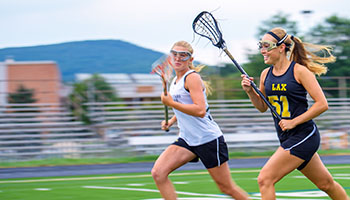HOW CAN WE HELP YOU? Call 1-800-TRY-CHOP
In This Section
Leveling the Field of Concussion Care: Minds Matter Fast-Tracks Novel Research

With Frontier Program support, the Minds Matter Concussion Program is fast-tracking its cutting-edge concussion research from the bench to the bedside.
limjr [at] chop.edu (By Jillian Rose Lim)
For Christina Master, MD, and Kristy Arbogast, PhD, leaders of the ever-innovative Minds Matter Concussion Program, it’s a top priority that every one of more than 4,000 youth with concussions coming to Children’s Hospital of Philadelphia yearly receive two key things: treatment based on the most current research, and the reassurance that concussions are a condition for which we have the tools to identify, manage, and treat. Now, with recent designation as a 2021 Frontier Program, Minds Matter is further championing this goal, fast-tracking its cutting-edge scientific knowledge from the bench to the bedside.
“Through Minds Matter, we wanted to ensure that wherever you sought care at CHOP for your concussion, you benefitted from the most state-of-the-art knowledge and research translated to the most up-to-date concussion care,” said Dr. Master, a sports medicine pediatrician at CHOP. “Frontier Program support enables us to advance to the next level and potentially make large paradigm shifts in our care for concussions. In other words, as a Frontier program, we can conduct more advanced research, to better understand concussion, and ultimately do more to care for our kids with concussion.”
Established in 2011, the Minds Matter program has always sought to optimize individual outcomes by staying at the forefront of concussion prevention, diagnosis, and care. Fueled by support from CHOP’s Chair’s Initiatives, as well as grants from the Centers for Disease Control and Prevention, the National Institutes of Health, the Pennsylvania Department of Health, and more, the team has already translated several of its discoveries in the research arena to clinical care.
Take, for example, a network-wide clinical decision support tool developed by Minds Matter researchers and spanning across departments from primary care to specialty care. This tool helped advance how clinicians interview patients when diagnosing concussions, what physical exam assessments they conduct, and which recommendations they make, and was shown to lead to robust and quick uptake of concussion management strategies.
Another example involves the recommendation of active rehabilitation strategies, like aerobic exercise and vestibular and vision therapy, that address issues that Minds Matter researchers have shown to be common with concussion, such as visio-vestibular deficits.
“Frontier support allows us to continue to accelerate this research, but most importantly, to rapidly translate it to the clinical setting so that kids coming to CHOP benefit from the research knowledge we have gained in the last decade,” said Dr. Arbogast, co-scientific director at the Center for Injury Research and Prevention (CIRP).
Frontier support also will drive next steps and future discoveries. In particular, and among other things, Dr. Master said that it will help fast-track the use of pupillometry, eye tracking, and other objective measures of concussion as diagnostic tools that would be clinically available for clinicians diagnosing and monitoring concussions. The Minds Matter Program describes much of the foundational work for these tools, as well as other completed foundational work, on their site.
When it comes to the big picture for Minds Matter, Drs. Master and Arbogast have a clear idea of what they hope to achieve as a Frontier Program. One key goal involves continuing to make discoveries that will help clinicians take each patient as an individual, recognizing their injury is unique to them.
“We’d like to be able to tailor a patient’s treatment to their concussion phenotype, which represent different subtypes of concussion,” Dr. Arbogast said. “What we’ve learned from both our research and our clinical care of large numbers of children and adolescents with concussion that come to CHOP, is that not all concussions look the same.”
Identifying the phenotype will be paramount to being able to direct their care in a targeted way.
Down the horizon, the team also hopes to de-mystify concussions.
“We want to continue to raise awareness of concussions as a treatable condition that we have specific diagnostic and therapeutic approaches for that result in great outcomes,” Dr. Master said. “Based on what we’ve learned from our research, and everything we’ve learned from kids, we want to make sure that families and patients know that they don’t have to be fearful.”
Concussions should be taken seriously, Dr. Master said, but through the communication of scientific knowledge and providing state-of-the-art concussion care, the team hopes to balance concern with optimism, and send the message to families that youth can recover from concussions.
Drs. Master and Arbogast emphasize that these goals — and the program’s past successes — have been made possible by Minds Matter’s most central characteristic and strength: its multidisciplinary nature.
“The fact that [Minds Matter] is led by Dr. Master and me, with Dr. Master being a sports medicine pediatrician and I, as a bioengineer, exemplifies the fact that concussion is something that touches so many disciplines within our institution,” Dr. Arbogast said. “We have collaborators from Emergency Medicine, Neurology, Critical Care, Genomics. That is exciting to me because it allows us to partner with so many people within CHOP. I really enjoy the multidisciplinary science because it adds a richness to what you’re doing, a richness to what your solutions are.”
With a diverse team, Minds Matter, no doubt, ensures patients receive comprehensive and thoughtful care.
“We have very intentionally, proactively, built this team, and we recognize it has a very 360 degree impact both on patients and their families and their interactions with the healthcare system,” Dr. Master said. “It takes a village to take care of these kids, and that’s been very rewarding — not only for our team, but hopefully also for our patients and families. They have a lot of touchpoints at CHOP, and with a multidisciplinary team, it really consolidates their sense that CHOP is a place where they can come and their whole person is taken care of.”